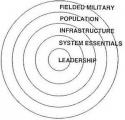Posted on the SWJ Blog is an entry of CNAS' new paper on the National Solidarity Program in Afghanistan (by John Nagl, Andrew Exum, et. al.). There is also an interesting embedded video of Exum explaining the program. What is particularly interesting to me is that the NSP is little different from the final and, according to the first US MILGP commander to support the war, COL John Waghelstein, most successful of the three successive Salvadoran national plans, Municipios en Accion (Municipalities in action). This plan - designed by Salvadoran President Jose Napoleon Duarte and US Ambassador to El Salvador, Ed Corr - allocated funds directly to the elected municipal governments for projects that those governments had identified.Sounds to me exactly like the NSP.
This approach is clearly one important strain of development theory applied to COIN that has been highly successful in all contexts in which it has been tried. I would go so far to argue that it really is the best approach to development as well as to the developmental component of COIN and other Small Wars. It is essential to the achievement of Host Government Legitimacy.
Cheers
JohnT










Bookmarks